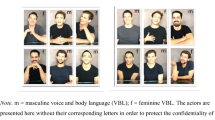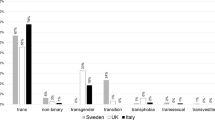Abstract
This article continues the discussion of new articulations of gender and sexuality in late modern societies. It examines the shaping of postfeminist, neoliberal subjectivity through the different articulations of ‘gay’ and ‘straight’, femininity and masculinity. The interrelatedness of discursive, material and affective in the constitution of subject positions is of special interest. This article includes an analysis of two makeover series – How to Look Good Naked and Queer Eye for the Straight Guy – and suggests that practices such as consumption, choosing ‘freely’ and bodily management constitute men and masculinity as well as women and femininity, even if the subject positions in the shows differ in ways that contribute to re-traditionalizing gender. Despite their reflexive ways of realizing the transformations, the programmes involve ambivalent ways of making gender difference, such as re-gendering masculinity and femininity. Also, the gay experts in the shows ambivalently participate in maintaining gender dichotomy and heteronormativity.
Similar content being viewed by others
Notes
How to Look Good Naked (2006–2008) UK, Channel 4.
Sillä silmällä (Queer Eye for the Straight Guy) (2006) Finland, Nelonen.
References
Adkins, L. (2000) Mobile desire: Aesthetics, sexuality and the ‘lesbian’ at work. Sexualities 3 (2): 201–218.
Adkins, L. (2001) Cultural feminization: ‘Money, sex and power’ for women. Signs: Journal of Women in Culture and Society 26 (3): 669–695.
Adkins, L. (2002) Revisions: Gender and Sexuality in Late Modernity. Buckingham & Philadelphia: Open University Press.
Akass, K. and McCabe, J. (2007) A perfect lie: Visual (dis)pleasures and policing femininity in nip/tuck. In: D. Heller (ed.) Makeover Television. Realities Remodelled. London & New York: I.B. Tauris.
Arthurs, J. (2004) Television and Sexuality: Regulation and the Politics of Taste. Buckingham & Philadelphia: Open University Press.
Banet-Weiser, S. and Portwood-Stacer, L. (2006) ‘I just want to be me again!’ Beauty pageants, reality television and post-feminism. Feminist Theory 7 (2): 255–272.
Beck, U. and Beck-Gernsheim, E. (1996) Individualization and ‘precarious freedoms’: Perspectives and controversies of a subject-orientated sociology. In: P. Heelas, S. Lasch and P. Morris (eds.) Detraditionalization: Critical Reflections on Authority and Identity. Oxford: Blackwell.
Berger, J. (1971) Ways of Seeing. London: Penguin Books.
Blackman, L. and Venn, C. (2010) Affect. Body & Society 16 (1): 7–28.
Bourdieu, P. (1986) Distinction. A Social Critique of the Judgement of Taste. London: Routledge & Paul Kegan.
Brunsdon, C. (2003) Lifestyling Britain: The 8–9 slot on British television. International Journal of Cultural Studies 6 (1): 5–23.
Butler, J. (1990) Gender Trouble: Feminism and the Subversion of Identity. New York: Routledge.
Byrne, B. (2006) White Lives. The Interplay of ‘Race’, Class and Gender in Everyday Life. London: Routledge.
Clough, P.T. (2010) Afterword: The future of affect studies. Body & Society 16 (1): 222–230.
Cronin, A. (2000) Consumerism and ‘compulsory individuality’. Women, will and potential. In: S. Ahmed, J. Kilby, C. Lury, M. McNeil and B. Skeggs (eds.) Transformations. Thinking Through Feminism. London & New York: Routledge.
Deery, J. (2004) Trading faces: The makeover show as prime-time ‘infomercial’. Feminist Media Studies 4 (2): 211–214.
Di Mattia, J.L. (2007) The gentle art of manscaping: Lessons in hetero-masculinity from the Queer Eye guys. In: D. Heller (ed.) Makeover Television. Realities Remodelled. London & New York: I.B. Tauris.
Duggan, L. (2003) The Twilight of Equality? Neoliberalism, Cultural Politics, and the Attack on Democracy. Boston, MA: Beacon Press.
Foucault, M. (2002) The Archaelogy of Knowledge. London & New York: Routledge.
Gill, R. (2007) Postfeminist media culture: Elements of a sensibility. European Journal of Cultural Studies 10 (2): 147–166.
Gill, R. (2008a) Culture and subjectivity in neoliberal and postfeminist times. Subjectivity 25 (1): 432–445.
Gill, R. (2008b) Empowerment/sexism: Figuring female sexual agency in contemporary advertising. Feminism & Psychology 18 (1): 35–60.
Gill, R., Henwood, K. and McLean, C. (2008) Body projects and the regulation of normative masculinity. Body & Society 11 (1): 37–62.
Gorton, K. (2009) Media Audiences. Television, Meaning & Emotion. Edinburgh, UK: Edinburgh University Press.
Hasanen, K., Koivunen, T. and Kolehmainen, M. (2010) Minä olen muistanut. Huomioita vuosituhannen vaihteen suomalaisesta feminismistä. Naistutkimus – Kvinnoforskning 23 (1): 35–46.
Hemmings, C. (2005) Invoking affect. Cultural theory and the ontological turn. Cultural Studies 19 (5): 548–567.
Holli, A.M. (2003) Discourse and politics for gender equality in late twentieth century Finland. Department of Political Science, University of Helsinki, Helsinki.
Lloyd, M. (1999) Performativity, parody, politics. Theory, Culture & Society 16 (2): 95–213.
McRobbie, A. (2004a) Postfeminism and popular culture. Feminist Media Studies 4 (3): 255–264.
McRobbie, A. (2004b) Notes on ‘what not to wear’ and post-feminist symbolic violence. In: L. Adkins and B. Skeggs (eds.) Feminism After Bourdieu. Oxford: Blackwell.
McRobbie, A. (2007) ‘Top girls?’ Young women and the post-feminist sexual contract. Cultural Studies 21 (4/5): 718–737.
McRobbie, A. (2008) Young women and consumer culture. An intervention. Cultural Studies 22 (5): 531–550.
McRobbie, A. (2009) The Aftermath of Feminism. Gender, Culture and Social Change. London: Sage.
Moseley, R. (2000) Makeover takeover on British television. Screen 41 (3): 299–314.
Mühleisen, W. (2007) Mainstream sexualization and the potential for Nordic new feminism. NORA – Nordic Journal of Feminist and Gender Research 15 (2–3): 172–189.
Mäkinen, K. (2008) Homon kanssa posliinikaupassa – Hetero-ja homominuuden tuotteistaminen tv-sarjassa Sillä silmällä. Naistutkimus – Kvinnoforskning 21 (2): 21–32.
Paasonen, S. (2007) Tavikset tapetilla: elämäntyyli-muutosohjelmat ja omannäköisyyden paradoksi. Lähikuva 2: 46–67.
Philips, D. (2008) What not to buy: Consumption and anxiety in the television makeover. In: G. Palmer (ed.) Exposing Lifestyle Television. London: Ashgate, pp. 117–128.
Pellegrini, A. (2002) Consuming lifestyle. Commodity capitalism and transformations in gay identity. In: A. Cruz-Malané and M.F. Manalansan IV (eds.) Queer Globalizations. Citizenship and the Afterlife of Colonialism. New York & London: New York University Press, pp. 134–145.
Ringrose, J. and Walkerdine, V. (2008) Regulating the abject. The TV make-over as site of neo-liberal reinvention toward bourgeois femininity. Feminist Media Studies 8 (3): 227–246.
Rose, N. (1990) Governing the Soul. The Shaping of the Private Self. London and New York: Routledge.
Sanders, H.E. (2007) Living a charmed life: The magic of postfeminist sisterhood. In: Y. Tasker and D. Negra (eds.) Interrogating Postfeminism. Gender and the Politics of Popular Culture. Durham and London: Duke University Press, pp. 73–99.
Seigworth, G.J. and Gregg, M. (2010) An inventory of shimmers. In: M. Gregg and G.J. Seigworth (eds.) The Affect Theory Reader. Durham and London: Duke University Press, pp. 1–25.
Sender, K. (2006) Queens for a day: Queer eye for the straight guy and the neoliberal project. Critical Studies in Media Communication 23 (2): 131–151.
Skeggs, B. (2004) Context and background: Pierre Bourdieu's analysis of class, gender and sexuality. In: L. Adkins and B. Skeggs (eds.) Feminism After Bourdieu. Oxford: Blackwell, pp. 19–33.
Skeggs, B. (2005) The making of class and gender through visualizing moral subject formation. Sociology 39 (5): 965–982.
Skeggs, B. and Wood, H. (2008) The labour of transformation and circuits of value ‘around’ reality television. Continuum: Journal of Media & Cultural Studies 22 (4): 559–572.
Tyler, I. (2008) ‘CHAV MUM CHAV SCUM’ class disgust in contemporary Britain. Feminist Media Studies 8 (1): 24–34.
Wearing, S. (2007) Subjects of rejuvenation. Aging in postfeminist culture. In: Y. Tasker and D. Negra (eds.) Interrogating Postfeminism. Gender and the Politics of Popular Culture. Durham and London: Duke University Press, pp. 277–310.
Wood, H. and Skeggs, B. (2004) Notes on ethical scenarios of self on British reality television. Feminist Media Studies 4 (2): 205–208.
Author information
Authors and Affiliations
Rights and permissions
About this article
Cite this article
Kolehmainen, M. Managed makeovers? Gendered and sexualized subjectivities in postfeminist media culture. Subjectivity 5, 180–199 (2012). https://doi.org/10.1057/sub.2012.7
Published:
Issue Date:
DOI: https://doi.org/10.1057/sub.2012.7




